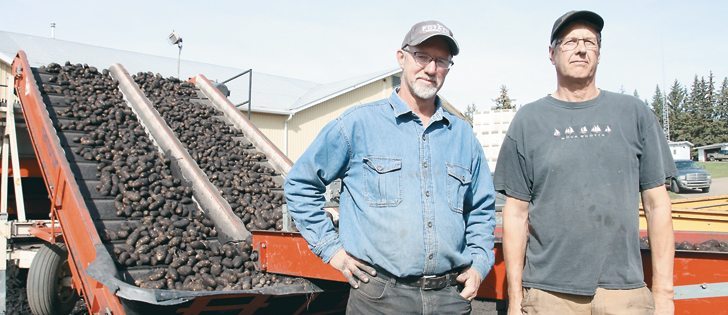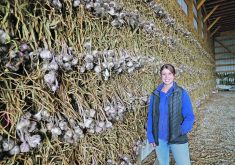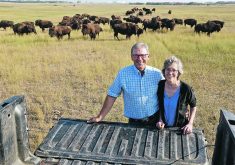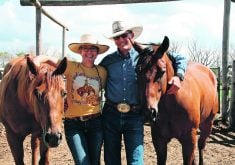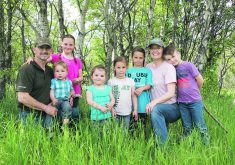Farm was forced to find new markets after potatoes were misdiagnosed with a disease that closed U.S. border to exports
FORT SASKATCHEWAN, Alta. — It’s Ernie Van Boom and Cecil Goutbeck’s 35th potato harvest and it’s going well.
Fall rain meant more of the rich top soil comes in from the field attached to the potato than they would like, but workers with shovels and wheelbarrows clean up the soil where it falls from the conveyor belts.
“We’re happy as everyone else that the weather is getting nicer,” said Van Boom, co-owner of North Bank Potato Farms.
Grain harvest on the rest of the 6,000 acres was also well underway.
“Before the rain, it came off really nice,” said Goutbeck.
Like most farms, rain or lack of rain dictates the season.
Potato harvest started Sept. 8 and if the good weather holds, the 570 acres of potatoes will be out of the field and into the storage bins by the second week of October.
The soil clinging to the potatoes will soon dry up and fall off when air begins to circulate around the potatoes in the giant storage sheds.
Potatoes and grain seem to be a good combination. The farm grows potatoes once every four years on the same land but sometimes the rotation drops to one in three years to ensure the potatoes are grown under one of the seven irrigation pivots.
Read Also

Fuel rebate rule change will affect taxes and AgriStability
The federal government recently announced updates to the fuel rebates that farmers have been receiving since 2019-20.
This year when the rain was scarce, the pivots ensured there was a crop for market.
Van Boom said he sometimes takes their rich, black soil northeast of Edmonton for granted. A few years ago, the family rented hay land 30 kilometres away to grow potatoes and was disappointed in the yield.
The soil is good for growing spuds, but it plays havoc with the specialty potato seeding, harvesting, handling and grading equipment. Repairs and maintenance are constant hassles with potato production because the soil infiltrates every bearing, chain or crack in the equipment.
When Van Boom and Goutbeck took over the farm from Goutbeck’s father, they raised table potatoes but it became clear their soil was ideal for growing seed potatoes. Their seed potatoes are sold to potato growers in Canada and the U.S.
“I married into potatoes,” said Van Boom, joking that he asked Goutbeck to be his partner in potatoes before asking his wife, Helen, to marry. Van Boom is married to Goutbeck’s sister.
Goutbeck and his wife, Shirley, have four children and Van Boom and Helen have five children.
North Bank Potato Farms is part of Edmonton Potato Growers, a potato co-operative of 10 growers. Most of the seed potato sales are made through the Edmonton Potato Growers, but the growers are encouraged to find and nurture additional markets.
“The co-op allows us to be proactive and find more markets and be proactive and visit our own buyers,” he said.
“They still want us to develop a grower to grower relationship.”
Those relationships were tested in 2007 when the Canadian Food Inspection Agency said a small single potato cyst nematode egg sac was discovered in one of their fields. The American border closed to Alberta potato farmers and the industry was thrown into chaos.
“It virtually put us out of business,” said Van Boom.
The impact has lingered, even though 40,000 subsequent soil samples by CFIA failed to find a single PCN.
The family couldn’t grow potatoes on land that once grew potatoes for two years. They were also forced to dump existing potatoes and scrub their equipment.
“We lost business for two years in a row.”
Luckily they had just sold some land for future energy development and the money from the sale of the land kept the family afloat.
“It hit us hard,” said Van Boom.
With the help of Edmonton Potato Growers, the Potato Growers of Alberta and the Canadian Horticulture Council, the family found markets for new potato varieties.
When PCN hit, they were growing four varieties for long established customers. After PCN, they lost their markets and started growing nine varieties for any possible market. They are now down to six varieties and have developed markets for the new varieties of seed potatoes.
“We went through a lot of pain. There was a lot of risk taking. Some varieties worked and some didn’t.”
A later analysis of CFIA’s disease management plan identified serious problems in how the federal agency dealt with the issue.
Before Van Boom was married, he worked in a power plant and couldn’t see his life in a small house with a picket fence.
“I wanted a challenge and the farm has never let me down,” he said.
Van Boom’s son, Russell, and Goutbeck’s son, Keith, have taken over the grain business and next year plan on taking over the potato business.
Van Boom said he never encouraged his children to take over the farm, but he is excited the next generation will bring new, fresh ideas to the business.
“It’s a great time to give the re-sponsibility to someone new,” he said. “I’ll still be here if they need me.”
Contact mary.macarthur@producer.com

